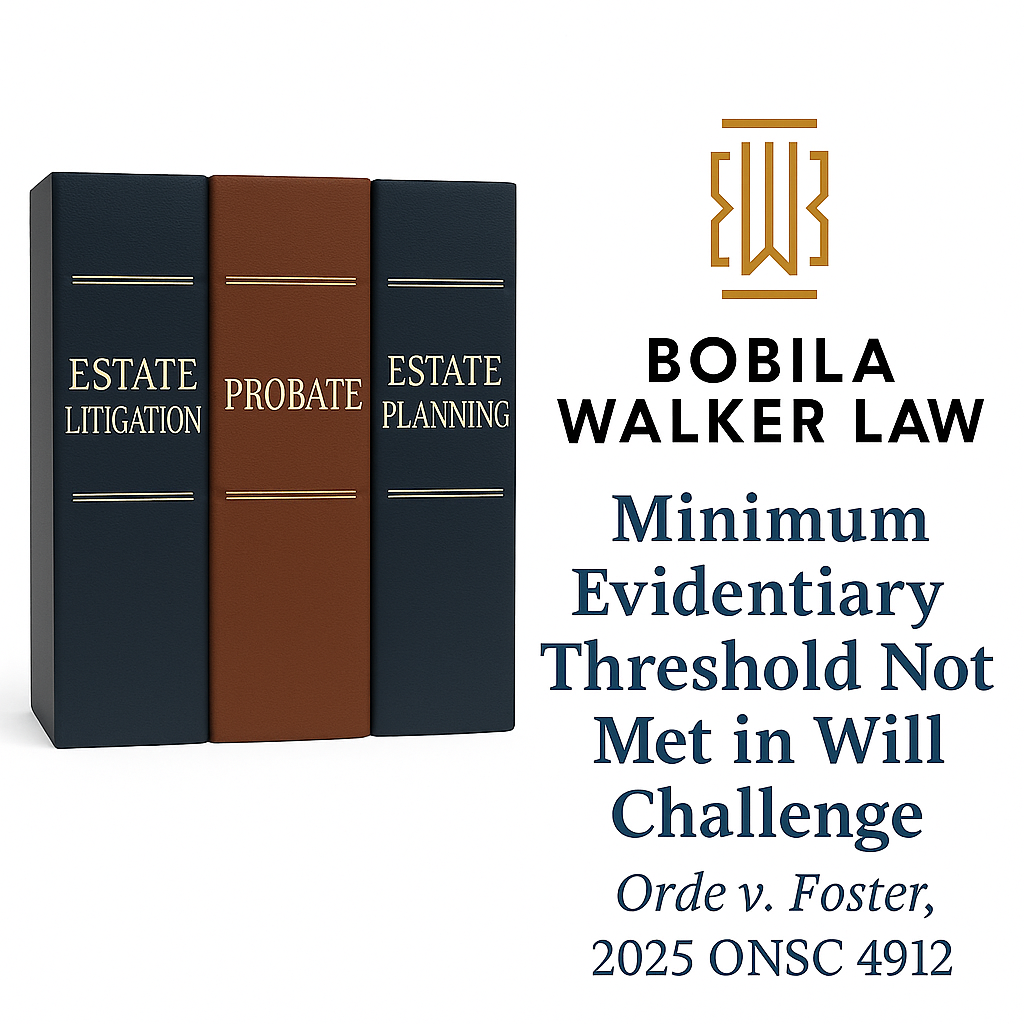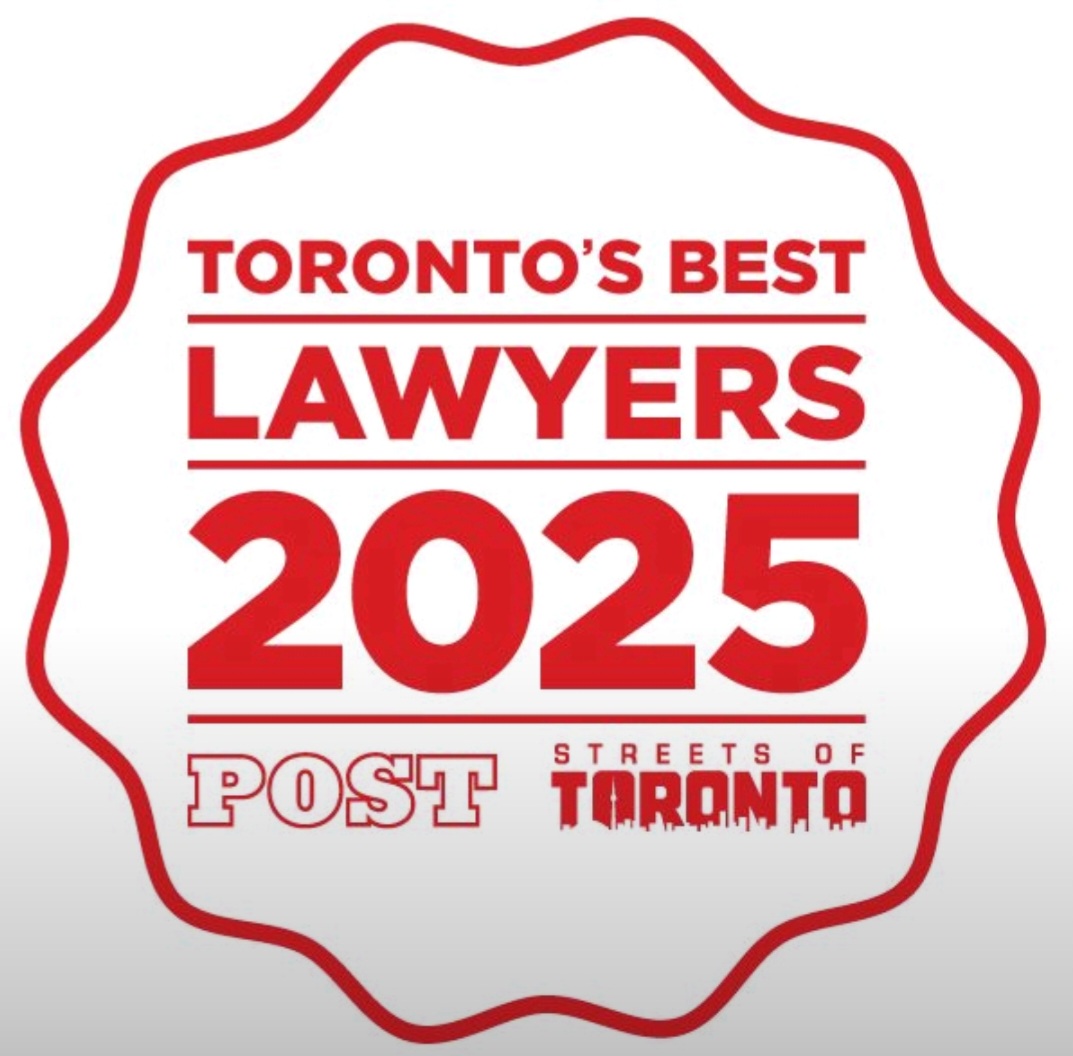Orde v. Foster, 2025 ONSC 4912 — Minimum Evidentiary Threshold Not Met in Will Challenge
Overview
In Orde v. Foster (2025 ONSC 4912), Justice A.A. Casullo of the Ontario Superior Court considered whether the Applicants—Wayne Brown’s children and stepchildren—had met the Minimum Evidentiary Threshold (MET) to advance a will challenge under Rule 75.06. They alleged undue influence and testamentary incapacity in relation to Wayne’s 2019 and 2020 wills.
The court held they had not met the Minimum Evidentiary Threshold. Medical evidence confirmed Wayne had capacity, the drafting solicitor’s notes and testimony pointed to independence, and allegations of undue influence were speculative. Further disclosure was denied, as the Applicants already had significant production under a prior order. Justice Casullo emphasized the policy rationale of avoiding needless depletion of modest estates through “fishing expeditions.” Costs were reserved, with the caveat that if the Applicants abandon their will challenge, she will address costs herself.
The Facts
Wayne Brown died in April 2021, leaving an estate valued at approximately $550,000, primarily his home. His wife Beverley had predeceased him in 2019. The blended family included Wayne’s biological sons, Beverley’s children, and extended relatives.
Wayne executed two wills close in time:
-
2019 Will (drafted by James Jordan, Steve Orde’s lawyer): named Steve and Roger as estate trustees, gave Christine Foster a life interest in Wayne’s home, his dog, and 25% of residue; Steve, Roger, and Gail Brown shared the remaining 75%. Shannon, Billie, and Kerrie were excluded.
-
2020 Will (drafted by Gary Ainsworth): named Christine and Shannon trustees (Billie as alternate), and divided residue 30% to Christine, 30% to Gail, 25% to Kerrie, and 15% to the Canadian Diabetes Association.
The Applicants (Roger, Steve, Shannon) argued that Wayne lacked testamentary capacity, that Christine unduly influenced him, and that the wills departed suspiciously from prior testamentary patterns. They sought further disclosure of financial records, solicitor files, and personal items.
The Respondents (Christine, Gail, Billie, Kerrie’s estate, and the Canadian Diabetes Association) resisted, arguing the Applicants had not met the Minimum Evidentiary Threshold to justify further production.
The Law
Rule 75.06 and the Minimum Evidentiary Threshold
-
Under Rule 75.06, an interested person can apply for directions regarding the proof of a will.
-
In Neuberger Estate v. York (ONCA, 2016), the Court of Appeal held that an applicant must first meet a Minimum Evidentiary Threshold: some reliable evidence that, if accepted, would call the will’s validity into question.
-
In Seepa v. Seepa (2017 ONSC), Justice Myers explained this requirement prevents estates from being consumed by litigation triggered by mere allegations. The MET is not proof of the case but a filter against baseless claims.
-
Johnson v. Johnson (ONCA, 2022) confirmed that while the bar is low, speculation and conjecture are insufficient.
Grounds for Challenge
-
Capacity: Testamentary capacity requires that the testator understands the act of making a will, the nature and extent of property, the claims of those who might expect to benefit, and the distribution scheme.
-
Undue influence: Defined in Geffen v. Goodman Estate (SCC, 1991) as domination of the testator’s will through manipulation, coercion, or abuse of power.
Analysis
Capacity
The Applicants claimed Wayne suffered cognitive decline after Beverley’s death. However, contemporaneous medical evidence told a different story. A February 2020 GAIN assessment by a geriatric specialist recorded Wayne’s MMSE at 30/30, higher than in 2016, and concluded there was no dementia and no functional decline. Wayne was grieving but remained fully cognitive. Justice Casullo accepted this medical evidence and found no concerns with capacity in 2019 or 2020.
Undue Influence
The Applicants alleged Christine inserted herself into Wayne’s life, isolated him, and pressured him into changing his will. They raised suspicions about gifts and even an alleged altercation. Justice Casullo noted that these claims, while serious on paper, were not substantiated by credible evidence.
By contrast, solicitor Gary Ainsworth’s testimony was pivotal. He met Wayne twice, each time alone, and carefully assessed capacity and independence. Ainsworth, a highly experienced estates lawyer and former Consent and Capacity Board Chair, specifically considered the risk of undue influence. His notes recorded Wayne’s dissatisfaction with family pressure from the Ordes and his wish to appoint Christine. He never met Christine until after Wayne’s death. Justice Casullo found Ainsworth a credible, independent witness, and his records dispelled any inference of undue influence.
Disclosure
The Applicants sought wide-ranging further production—including Beverley’s estate planning records from 2007. Justice Casullo rejected this request. The Applicants had already been granted extensive disclosure in a 2022 order but failed to act on it (e.g., they did not obtain financial records). With legal fees already consuming 27% of the estate, further disclosure would be disproportionate. The judge stressed that the MET exists to prevent exactly this kind of expensive fishing expedition in modest estates.
Lessons Learned
-
The Minimum Evidentiary Threshold is real: While a low bar, it still requires tangible, reliable evidence—not conjecture or speculation. Courts will shut down attempts to fish for evidence without a proper foundation.
-
Medical records are decisive: Contemporaneous cognitive assessments (here, an MMSE of 30/30 with no dementia) strongly support capacity and can resolve threshold disputes early.
-
Independent solicitors are powerful witnesses: Detailed notes, caution around potential undue influence, and professional vigilance carry great weight in rebutting allegations.
-
Modest estates demand proportionality: Courts are alert to the risk of litigation costs consuming estates. Will challenges must be supported by evidence, not just dissatisfaction with testamentary dispositions.
-
Suspicion is not enough: Courts distinguish between familial discord and actual undue influence. A testator’s dissatisfaction with children or stepchildren, reflected in changed wills, does not equate to incapacity or domination.






